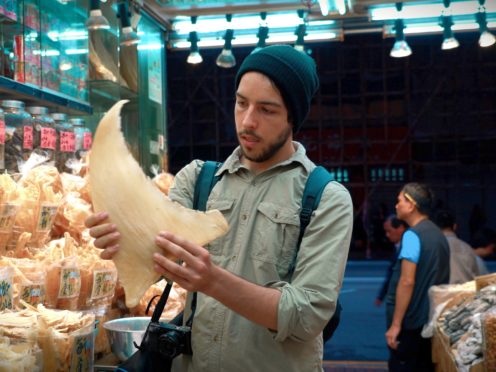The director of the hit Netflix documentary Seaspiracy has called on the UK government to create and enforce “no-catch” marine reserves in at least 30% of UK waters.
The film about the fishing industry’s impact on sea life and the oceans has been a juggernaut success on the streaming service, and a petition set up by Ali Tabrizi, the film’s director and narrator, has garnered more than 660,000 signatures.
It calls on George Eustice, the Environment Secretary, to create and enforce “no-catch” zones to protect vulnerable wildlife and aid the recovery of their habitats.
British filmmaker Tabrizi told the PA news agency: “One of the core things we need to do is protect large areas of our ocean, and the most scientific, evidence-based, realistic goal is to protect 30% of our oceans from industrial fishing by the year 2030.
“And the reason why we say industrial fishing there is there are marine protected areas around the world.
“Unfortunately, they are more like paper marine reserves, they don’t actually do anything because they still allow extraction.
Join the movement to save our seas.
Sign our petition to protect 30% of our ocean from industrial fishing by the year 2030.https://t.co/d4OsgN4W9g pic.twitter.com/BSCECzBQiO
— seaspiracy (@seaspiracy) May 4, 2021
“So even though in the UK we have a number of marine protected areas, if you look at the number that are actually protected from the leading threat to those areas, it’s 0.00002% of UK domestic waters are protected.”
He added: “It is absolutely pathetic.
“The same goes worldwide.
“I mean, in Canada, I think they have something like 14% protected, but when you look into it, it’s really none of it is protected.
“Irish waters, there’s none.
“China, there’s none.
“And this is where most of the wildlife is, most life on earth is in the oceans, we need to protect these these ecosystems, and yet they’re not protected.
“And that’s why we’ve had hundreds of thousands of people sign this petition, who are desperate for their world leaders to listen to them and put into effect these sanctuaries.”
In China, there is not a single effective marine protected area, despite having the world’s largest fishing fleet and accounting for nearly half of the world’s fisheries. pic.twitter.com/c09CPIo4Qc
— seaspiracy (@seaspiracy) May 4, 2021
Tabrizi said the impact of implementing these changes would be “phenomenal” but it is not the first step.
He added: “For me the first step is always changing ourselves, you can’t really point fingers when you when you when you haven’t made some changes yourself.
“And that’s why we advocate in the film to shift to a plant-based diet.
“It’s one of those simple and powerful things we can all do everyday to combat this crisis.
“But it comes a point where you need actually institutional and systemic changes to come in, and that’s why we want to achieve this this goal of protecting 30% of our oceans, because that would guarantee preserving our oceans for future generations, enabling coastal communities to continue to survive, the leading threat to those coastal fishing communities is industrial fishing.
“It’s benefits would be for the ecosystem for wildlife and for people, and that’s why we want to achieve that by the year 2030.”
The film questions the notion of sustainable seafood and and examines whether Dolphin Safe and Marine Stewardship Council labels provide the assurances consumers might think they are providing.
Tabrizi rejected claims from organisations that they have been misrepresented or misquoted in the documentary.
He said: “We asked straightforward questions and I don’t think they were ready for it.
“I don’t think they were expecting it.
“They may not have taken us seriously in those interviews, where it was small teams, small cameras, and I think they let their guard down.
“We didn’t take anything out context.
“What they said was what was in the interview?
“How can you take out of context that you can’t guarantee no dolphins are killed in those nets?
“How can you take out context, the fact he said the observers they have get bribed.
“So no, I don’t believe anything was taken out of context.
“And in fact, we could have gone a lot harder on those groups.
“And we’ve revealed a lot more that we’ll be releasing on our social media, but we just didn’t include in the film, because we ran out of time.
“So no, I don’t accept that criticism.”
Seaspiracy is streaming now on Netflix.
